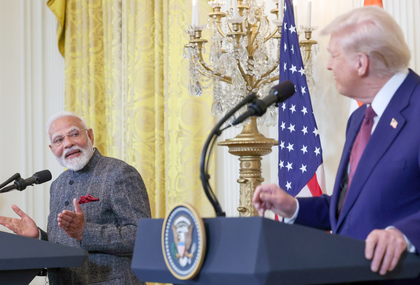Trump tariffs 'small slice' of Indian economy, opportunity to broaden markets: Expert
By IANS | Updated: August 28, 2025 08:50 IST2025-08-28T08:49:03+5:302025-08-28T08:50:17+5:30
Washington, Aug 28 Richard Rossow, a leading expert on India-US economic ties and the Chair of India and ...

Trump tariffs 'small slice' of Indian economy, opportunity to broaden markets: Expert
Washington, Aug 28 Richard Rossow, a leading expert on India-US economic ties and the Chair of India and Emerging Asia Economics at the Centre for Strategic and International Studies (CSIS), has said that Washington's punitive measures would not have a considerable impact on India's growth but still present the country with a "unique opportunity" to diversify its markets and usher in major domestic reforms.
"We're talking about a relatively small slice of the Indian economy. Manufacturing is only about 14 per cent of the GDP. Most labour is in agriculture. Most economic output is in services. And between the United States and India, too, IT services remain the ultimate bedrock of a lot of our commercial relations. Remember that the vast bulk of what's happening in India on the economy, whether you're talking about labour, economic output, is not in the basket," Rossow said.
He argued that India's response of diversifying its export markets and undertaking major domestic reforms "makes a lot of sense."
"I do understand, while certainly hoping that the repair can be made, a trade agreement can be inked and commercial ties can grow, India needs to strike out in other directions and build more significant economic partnerships," he added.
However, Rossow stressed that "keys to growth in India do not lie in a relationship with the United States or a trade agreement with anybody," but with domestic reforms, especially in states.
"There are still so many significant reforms that need to happen. They can improve labour markets. Fix a lot of the basic bread and butter that's going to make the economy function, make manufacturing take off. If those things improve and get right, then I think companies, irrespective of how our relations between governments look, companies are going to go to India for the domestic market," he suggested.
Rossow also suggested that Washington's decision to go ahead with secondary tariffs was likely a "negotiating tactic" aimed at extracting a more favourable deal from New Delhi.
"I think the Trump administration has two objectives. One is trying to get India to complete the trade agreement by pushing India on some market access issues that they weren't willing to move on. And second is to put additional leverage on Russia. But the fact that you haven't seen the same tariffs put against China, Turkey and other major energy buyers tells me that it does feel like India is being singled out," he added.
US Treasury Secretary has accused India of "profiteering" from Russian oil on multiple occasions, arguing that since the beginning of the war in Ukraine, China's share of Russian oil imports has marginally increased while it has skyrocketed for India from less than 1 per cent to around 35-40 per cent.
India has defended its approach, contending that its purchases were in the national interest and in defending the country's strategic autonomy.
Looking ahead, Rossow remained optimistic of a possible deal in the near term.
"I think it's still possible. Neither side has announced the intention to stop negotiations. I am hearing signals from both sides that they're still trying to find a pathway forward. India so far has not fought back. They're trying to find a pathway forward, and they got a lot of tools at their disposal to sweeten the pot," he added.
On the possibility of a call between Prime Minister Narendra Modi and US President Donald Trump to iron out contentious issues, Rossow observed that it may not be the "best scenario" at the moment.
"We've seen leaders when they meet with President Trump. Sometimes it's a warm, cordial meeting; other times it can go in very disturbing directions. So you never know. And I think we're in such a tense moment right now, unless India can get a lot of detail and information about what's expected to transpire, which the Trump administration is well known for not necessarily communicating what the agenda looks like ahead of time, it can be a dangerous moment," he emphasised.
Disclaimer: This post has been auto-published from an agency feed without any modifications to the text and has not been reviewed by an editor
Open in app